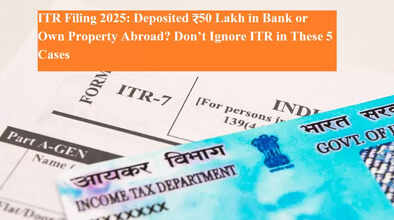ITR Filing 2025: Deposited ₹50 Lakh in Bank or Own Property Abroad? Don’t Ignore ITR in These 5 Cases

As the deadline for filing Income Tax Returns (ITR) for FY 2024–25 nears, taxpayers across India are busy calculating income, deductions, and liabilities. However, many individuals remain unaware that ITR filing is mandatory not just when income exceeds the basic exemption limit, but also in several other scenarios.
Whether you’ve made large deposits in your bank account, spent big on international travel, or own property overseas—filing an ITR becomes compulsory under certain conditions, regardless of whether tax was deducted or not.
Let’s clear up the confusion and understand when ITR filing is legally required—even if you think you’re not liable to pay tax.
📌 Why ITR Filing Isn’t Just About Tax Deduction
Many salaried and retired individuals mistakenly believe that if tax has already been deducted at source (TDS) from their salary or bank interest, they don’t need to file ITR. Others think merely holding a PAN card requires filing returns.
These assumptions are incorrect. Paying tax and filing an ITR are two distinct obligations—both of which are important for financial compliance and future documentation.
🧾 Here Are 5 Situations When You Must File ITR in 2025:
1️⃣ If Your Total Income Exceeds the Basic Exemption Limit
If your gross total income before deductions under Chapter VI-A (such as Sections 80C, 80D, 80G, 80TTA, etc.) crosses the basic exemption threshold, you are required to file an ITR.
Basic exemption limits under old tax regime:
-
₹2.5 lakh for individuals below 60
-
₹3 lakh for senior citizens (60+)
-
₹5 lakh for super senior citizens (80+)
Under new tax regime:
-
₹3 lakh flat for all taxpayers
Also, if you claimed exemptions on Long-Term Capital Gains (LTCG) under Sections 54, 54EC, or 54F, you must include these in your total income while determining the need for ITR filing.
2️⃣ If You Own Assets or Have Financial Interests Outside India
If you are an Indian resident for tax purposes and:
-
Own property or assets abroad
-
Have a signing authority in a foreign bank account
-
Have investments in foreign mutual funds, shares, or ESOPs
Then, filing an ITR becomes mandatory, even if you haven't earned any income from these foreign holdings.
3️⃣ If You Cross Certain Expense Thresholds
The Income Tax Department mandates ITR filing if you've incurred specific high-value expenses, such as:
-
Paid electricity bills of over ₹1 lakh in a year (even if the meter is not in your name)
-
Spent over ₹2 lakh on foreign travel, regardless of whether it was for you, your family, or someone else
4️⃣ If You've Deposited Large Amounts in Bank Accounts
Even if your income is below the tax exemption limit, certain high-value deposits require you to file ITR:
-
Deposited ₹1 crore or more in one or more current accounts
-
Deposited ₹50 lakh or more in savings accounts
This includes all forms of deposit—cash, cheque, or digital transfers.
5️⃣ If Your Business Turnover or Professional Fee Is High or TDS/TCS Exceeds Limit
If you’re a business owner or professional, and:
-
Your gross receipts exceed ₹60 lakh (business) or ₹10 lakh (profession)
-
You have had TDS or TCS of ₹25,000 or more deducted in the year
(₹50,000 for senior citizens)
Then, ITR filing is mandatory, even if your final tax liability is zero.
📌 Conclusion: Don’t Assume, Know Your Filing Obligations
This detailed breakdown makes it clear that ITR filing is not limited to tax-paying individuals alone. Even those with high transactions, overseas investments, or substantial TDS must comply with filing requirements.
Filing your ITR:
-
Keeps you compliant with tax laws
-
Helps when applying for visas or loans
-
Assists in claiming TDS refunds
-
Establishes a financial track record

